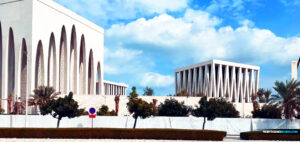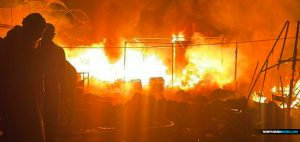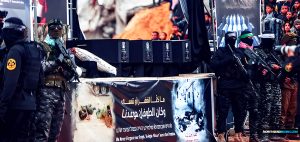Al-Qaeda
Islamic Terrorists Issue Threat To ‘Hit Israel’ In Coming Weeks
Israeli and Jewish targets all over the world are likely to be sought out by terrorist organizations in the coming weeks, the Israeli government’s Counter-Terrorism Bureau warned in strikingly strident tones on Monday, listing dozens of countries where it said it had “concrete” indications of a terrorist threat.

On anniversary of 9/11 and celebration of Rosh Hashana
Israeli and Jewish targets all over the world are likely to be sought out by terrorist organizations in the coming weeks, the Israeli government’s Counter-Terrorism Bureau warned in strikingly strident tones on Monday, listing dozens of countries where it said it had “concrete” indications of a terrorist threat.

Suspected Hezbollah weapons cache uncovered May 2013 in Kano, Nigeria. (screen capture: Youtube/Euronews)
It cited concerns about terrorist acts timed to coincide with the forthcoming Rosh Hashana (New Year), Yom Kippur and Succot festivals, and also said that the anniversary of the 9/11 terrorist attacks in the US was likely to be “a favored period” for al-Qaeda and other global jihadist groups to attempt to carry out acts of terrorism.
Iran and Hezbollah, it warned, were continuing their “global terror campaign” against Israeli and Jewish targets. It noted that Iran remained bent on avenging alleged Israeli responsibility for the killing of Hezbollah terror chief Imad Mughniyeh in a Damascus car-bombing in 2008, and the deaths of three Iranian nuclear scientists.
It said its information indicated that Israeli businessmen and ex-government officials were prime potential targets for assassination and/or kidnapping.
With all that in mind, the bureau reconfirmed that Israelis are barred altogether from travel to Iran, Lebanon, Syria, Iraq, Saudi Arabia and Yemen, where the “concrete” terror threat was “very high.”
In addition, it ordered Israelis not to travel to Sudan, Somalia, Algeria, Djibouti, Mauritania, Libya and Tunisia, and to leave these countries immediately if they were there, because of a similarly “very high” terror threat. Where Tunisia was concerned, it underlined what it said were the “threats to carry out attacks on Israeli and Jewish targets.”
The unusually shrill and widespread alert included an order to Israelis not to travel to the Sinai Peninsula, because of the chaotic situation in Egypt. The Sinai’s Red Sea resorts are a traditionally popular holiday destination for Israelis, especially at this time of year. The advisory noted that Sinai was off limits not only because of the general Egyptian disorder and a series of recent attacks in the Sinai, however, but also because of “information on the intention to carry out further attacks.”
Using only slightly less urgent language, the bureau, part of the National Security Council under the authority of the Prime Minister’s Office, ordered Israelis to “avoid visiting” the United Arab Emirates, Bahrain, Jordan, Kuwait, Egypt and Qatar, where it cited what it called a “basic” terrorist threat. Israel maintains peace agreements with both Jordan and Egypt, and the warning underlines what the bureau called “the complex security realities” in nations adjacent to Israel.
The bureau also told Israelis to postpone nonessential visits to Turkey, Oman and Morocco, because of “ongoing potential threats.”
Slightly further afield, it cited “very high” terror threats in Afghanistan, parts of southern Thailand, parts of the southern Philippines, east Senegal, India’s Kashmir province, northern Nigeria, parts of Kenya, and Chechnya. Israel were not to travel to any of those areas, and to leave immediately if they were there, it ordered.
The advisory also specified a “high” terror threat in Indonesia, Burkina-Faso, Ivory Coast, Togo, Mali, Malaysia and Pakistan, telling Israelis not to go there and urging them to leave as soon as possible if they were there now.
The bureau’s warning also specified concerns about terror threats to Israeli “business targets” worldwide, and especially in Africa, “in the wake of the exposure of a terrorist infrastructure in Nigeria over the past year.” Generally, it urged Israelis traveling worldwide to take extra precautions, such as avoiding unexpected meetings or out of the way places, and to change regular travel routes. source – Times of Israel

Al-Qaeda
Obama Administration ‘Loses’ Half Billion In Military Weaponry To al-Qaeda In Yemen
Pentagon officials cannot track the whereabouts of $500 million worth of military equipment the U.S. donated to Yemen since 2007 – raising alarms that the hardware may have ended up with al-Qaeda or Iranian-backed rebels.

Pentagon officials cannot track the whereabouts of $500 million worth of military equipment the U.S. donated to Yemen since 2007 – raising alarms that the hardware may have ended up with al-Qaeda or Iranian-backed rebels.
Ever wonder how al-Qaeda and ISIS always have such advanced weaponry and military capabilities? Wonder no more! Obama gives it to them, that’s how they do it. Did you think it was a trick question?
U.S. officials said Tuesday that increasing instability in Yemen has made it impossible to keep tabs on donated equipment that includes small arms, ammunition, patrol boats and night-vision goggles, according to The Washington Post.

U.S. firearms supplied to the Interior Ministry in Yemen, which has received $500 million in aid from the United States since 2007 under an array of Defense Department and State Department programs. (Government Accountability Office)
“We have to assume it’s completely compromised and gone,” a legislative aide on Capitol Hill, speaking on the condition of anonymity, told The Post.
In January, Yemen’s government was overtaken by Iranian-backed Shiite Houthi rebels. The rebels are increasingly taking over military bases.
Since then, the U.S. closed its embassy in Yemen and the Defense Department has stopped delivering equipment to the country, including a shipment of $125 million worth of military products scheduled to be delivered earlier this year.
This is the equipment no one can find, The Post reports:
- 1,250,000 rounds of ammunition
- 200 Glock 9 mm pistols
- 200 M-4 rifles
- 4 Huey II helicopters
- 2 Cessna 208 transport and surveillance aircraft
- 2 coastal patrol boats
- 1 CN-235 transport and surveillance aircraft
- 4 hand-launched Raven drones
- 160 Humvees
Al-Qaeda
Al-Qaeda Affiliate Threatens To Kill American Hostage Luke Somers
Luke Somers, a 33-year-old photojournalist, was abducted in 2013 in Sanaa, the capital of Yemen, according to media reports. In a YouTube video published Wednesday, he says he is certain his “life is in danger.”

An al-Qaeda affiliate has threatened to kill an American hostage in three days if the U.S. government does not respond to the group’s demands, according to terrorist monitoring group Site Intelligence Group.
Luke Somers, a 33-year-old photojournalist, was abducted in 2013 in Sanaa, the capital of Yemen, according to media reports. In a YouTube video published Wednesday, he says he is certain his “life is in danger.”

The video features an al-Qaeda official and a brief message from Somers – dressed in a purple shirt and with a shaved head – at the end. He notes that he was born in England but has American citizenship and lived in America for most of his life.
The al-Qaeda operative who speaks throughout much of the video and threatens that Somers will meet his “inevitable fate” if the group’s demands are not met is Nasser bin Ali al-Ansi of the Arabian Peninsula affiliate, Site Intelligence Group said. The video does not list what those demands are, but al-Ansi says Washington is “aware” of them.
“It’s now been well over a year since I’ve been kidnapped in Sanaa,” Somers said in the footage. “Basically, I’m looking for any help that can get me out of this situation. I’m certain that my life is in danger. So as I sit here now, I ask, if anything can be done, please let it be done. Thank you very much.”
Somers was kidnapped in September 2013 from a street in Sanaa, where he had worked as a photojournalist for the Yemen Times, the Associated Press said.
Read the rest of this story on USA Today…
Al-Qaeda
Islamic Terrorists Foster Jihad With Over 90 Tweets Per Minute On Twitter
Abdulmunim Al-Mushawah revealed that about 129,600 tweets were posted by accounts affiliated to terror groups in October 2014. As a result, at least 500 accounts believed to have been run by terrorists were deactivated.

Islamic terror groups post at least 90 tweets every minute, a new report has found
The data was revealed in a survey conducted by the Saudi-based Sakina, an independent, non-governmental organisation created to engage in dialogue online as a way to combat internet radicalization.

Results showed that terror groups such as the Syrian Islamic Liberation Front, Al-Nusra Front and Islamic State (ISIS) use social media to recruit new members and to spread their propaganda.
Abdulmunim Al-Mushawah, head of the organisation, revealed that about 129,600 tweets were posted by accounts affiliated to terror groups in October 2014. As a result, at least 500 accounts believed to have been run by terrorists were deactivated.
Al-Mushawah urged for a censorship committee to be put in place in order to monitor tweets that could be written to promote insurgents’ propaganda. “The nature of the extremist can be understood by analysing his posts, identifying his social circle and understanding his internal motives and history,” he was quoted by the Saudi Gazzette as saying.
“After understanding and recognising the type of extremist the person is, we can then follow the appropriate method of dialogue knowing that it is a lengthy and complicated process at times.
“The responsibility of protecting the general public from terrorist activities does not only lie with the official directorates. It is also the responsibility of the media, mosques and educational institutes,” he continued.
“Public awareness and guidance are the campaign’s top priorities because it is important to teach people how to face one problem without creating another.”
-

 George Soros8 years ago
George Soros8 years agoProof Of George Soros Nazi Past Finally Comes To Light With Discovery Of Forgotten Interview
-

 Election 20168 years ago
Election 20168 years agoDEAD POOL DIVA: Huma Abedin Kept Those Hillary Emails That The FBI Found In A Folder Marked ‘Life Insurance’
-

 Election 20168 years ago
Election 20168 years agoCrooked Hillary Campaign Used A Green Screen At Today’s Low Turnout Rally In Coconut Creek FL
-

 George Soros8 years ago
George Soros8 years agoSORE LOSER: George Soros Declares War On America As Violent MoveOn.Org Protests Fill The Streets
-

 Donald Trump8 years ago
Donald Trump8 years agoDonald Trump Will Be 70 Years, 7 Months And 7 Days Old On First Full Day In Office As President
-

 Headline News8 years ago
Headline News8 years agoIf Hillary Is Not Guilty, Then Why Are Her Supporters Asking Obama To Pardon Her? Hmm…
-

 Election 20168 years ago
Election 20168 years agoWikiLeaks Shows George Soros Controlling Vote With 16 States Using SmartMatic Voting Machines
-

 End Times8 years ago
End Times8 years agoFalse Teacher Beth Moore Endorses The Late Term Partial-Birth Abortion Candidate Crooked Hillary









































































